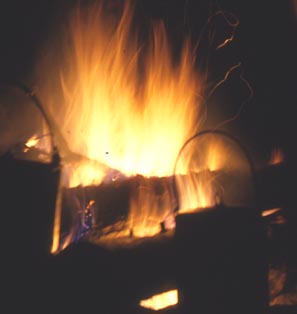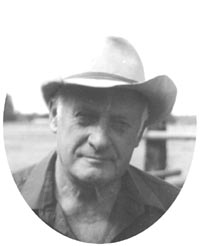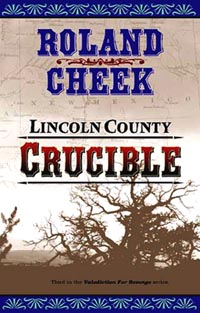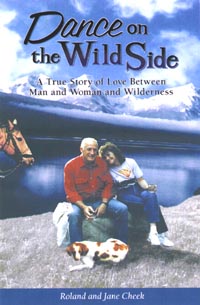a weblog sharing info on outdoor skills and campfire musing by a guy who spends a bunch of time in pursuit of both
CULTURE
WHERE -
TALES ARE TOLD OF
Welcome to Roland Cheek's Weblog
Roland is a gifted writer with a knack for clarifying reality. Looking forward to more of his wisdom
- Carl Hanner e-mail
There can be no living together without understanding, and understanding means compromise. Compromise is not a dirty word, it is the cornerstone of cvilization, just as politics is the art of making civilization work. Men do not and cannot and hopefully will never think alike, hence each must yield a little to avoid war, to avoid bickering. Men and women meet together and adjust their differences; this is compromise. He who stands unyielding upon a principle is often a fool, and often bigoted, and usually left standing alone with his principle while other men adjust their differences and go on. * Louis L'Amour in Bendigo Shafter / (Pretty sharp, those Western writers.)
To access Roland's weblog and column archives
Tip o' the Day
Domestication of the horse and creating computer technology represents different dimension in human defelopment. Yet their operations share remarkable parallels.
Horses, as most of us know, are clumsy brutes with high performance capabilities and low actuarial proclivities. Computers, on the other hand, have enormous capabilities and a frustrating insistence on operating outside the realm of human comprehension.
Riding your pony to meet a friend? Don't count on the ride to be a pleasant one. If you're headed away from the barn, your steed will travel at a crawl. If you cluck him into a trot, he'll rattle your teeth; kick him into a gallop and he'll crow-hop or try to swerve back to the barn. Will you arrive on time for your assignation? No.
On to the computer front: I had a newspaper deadline to meet. At first, my screen went dead. Then it jumped to another file. When at last I cornered the confounded thing and hit my print button, it must have been set for a thousand copies.
The advice from this corner is don't try to meet deadlines when depending on either.
Yet turn that horse and head for home and you'll be sitting back before your computer screen in short order. If you hold him to a walk, your pony will convince you he was bred for overseeing Tennessee cotton fields. Let him trot and you'll believe he's on the European show circuit. Or let him swing into a canter and you'll have to bend low to keep from being blown from the saddle.
Your computer has remarkably similar capacities. Tap into it in the middle of an insomniac night and you'll be able to enter programs you never dreamed existed--draw diagrams, do spread sheets, create stunning prose in exotic text. Try a repeat performance the day after tomorrow, however, and watch the infernal machine sulk while you blow a gasket.
Horses dominate a farm. Computers dominate a home.
Need more similarities? How about their most qualified handlers?
Techno geeks / computer nerds live in their own insular world, just like the teenage girl down the road who sees more class in horses than in her high school's football star.
In the final analysis, the greatest similarity between the horse and the computer lies not so much in their performance, but in their operators. Horses, you see, are really quite intelligent. So are computers. It's their users who are dumb.
Echoes of Vengeance -- A military outpost situated in an isolated region of the Department of the Upper Missouri. An embittered Commandant who believes unkind fate kept him from fame and glory during the recent War of Seccession. A band of starving Blackfeet too riddled with smallpox to withdraw to their reservation. A young mixed-blood army interpreter whose aging parents are with the Blackfeet tries to prevent a massacre-in-the-making; he's beaten and dragged to the guardhouse for the attempt.
Thus the stage is set and principal characters in place for the opening pages of Echoes of Vengeance * Mule Milk News / Official Newsletter of the Montana Outfitters and Guides Association
WHO SAYS GOOSE HUNTING IS EASY?
My first goose hunt sticks in the memory like lint on a wool sweater. I'd hunted wood ducks and mallards along the creek that flowed by our Oregon home. And had even drift-hunted mallards from a rubber raft on the big river. But in both cases, it was jump-shooting pure and simple.
Jump-shooting is, of course, hard work, pushing through brambles and briars that snag and rip. Or rowing feverishly from one side of the river to the other in order to drift past a patch of brush hanging into the water. That's why I was elated to get the invitation to join one of my elk hunting buddies and his son for a goose hunt on a large bottomland farm 150 miles from my home.
After what I was accustomed to during my previous waterfowl odysseys, sitting comfortably in a blind, swigging coffee or hot chocolate while waiting for unsuspecting honkers to set their wings overhead would be a snap. Even get time to check proper lead, muzzle swing, and sque-e-e-ze. I even told Jane not to buy a turkey for Christmas, "We'll have wild goose instead." Privately I expected to bring home one for New Years, too.
We pulled up to the edge of the cornfield long before daylight. I couldn't make out much in the auto's headlights, so I asked Al, "Just how big is this farm anyhow?"
"Oh, I don't know," my friend replied. "Maybe a couple of thousand acres. If you're wondering how far we'll walk, it's some ways yet. The marsh is over in Yamhill County."
"Heck," I told him. "I'm up to the walk. You bet. You can count on me."
"Good. Carry these." He handed me a bulging burlap sack.
When he handed out another, I asked, "What're these?
"Decoys," Al said. "You can't hunt honkers without decoys. Don't you know anything?"
"Of course it's decoys," I said. "I was just funning you."
He grabbed another sack and his son grabbed a sack and we began a four-in-the-morning grueling trek through muddy cornfields so big Iowa would've blushed. After a half-hour of steady barn boot stumbling, I asked, "Couldn't we have driven a little closer?"
"You don't want a car anywhere around," Al replied. "Might scare the birds."
Pink was just beginning to tinge the east when puffing like one-lung tractors, we arrived where the cornfield bordered a marsh. "Gotta hurry," Al said, pulling up the tops to his hip boots. "You can wade out as far as you can and throw your dekes out, I'll wade farther and place 'em."
I waded too far. When I stumbled back to the blind, I said, "My feet are wet and cold. What do I do now?"
"Be quiet. Get down and don't move. Can't you hear them?"
Yes I could hear them! In the far-off distance there was goose music! My feet were no longer cold. If they were wet, I didn't notice.
Al lifted his call. The rest was all a-blur. I remember the hongers circling our decoys, then setting their wings. But I don't remember my carefully gauging the distance or analyzing their speed, size, gender, or age. I only remember my friend waving me down and urgently whispering, "Now!" and me springing to my feet, pointing my shotgun and jerking the trigger.
And I remember my first taste of a cornfed honker.
Roland Cheek wrote a syndicated outdoors column (Wild Trails and Tall Tales) for 21 years. The column was carried in 17 daily and weekly newspapers in two states. In addition, he scripted and broadcast a daily radio show (Trails to Outdoor Adventure) that aired on 75 stations from the Atlantic seaboard to the Pacific Ocean. He's also written upwards of 200 magazine articles and 12 fiction and nonfiction books. For more on Roland, visit:
www.rolandcheek.com
Recent Weblogs
Tuesday, December 9, 2008
There's a bunch of specific info about Roland's books, columns, archives and radio programs. By clicking on the button to the left, one can see Roland's synopsis of each book, read reviews, and even access the first chapter of each of his titles. With Roland's books, there's no reason to buy a "pig in a poke."
for detailed info about each of Roland's books
Read Reviews
Read their first chapters
For interested educators, this weblog is especially applicable for use in history, economic, and government classes, as well as for journalism students.
Roland, of course, visits schools. For more information on his program alternatives, go to:
NEXT WEEK:
THE CURSE OF PROVINCIALISM
www.campfireculture.com
Roundup Magazine says of The Silver Yoke, the final book in the acclaimed Valediction For Revenge series: This novel has lots of action, a terrific villain you love to hate, the smell of dust and dynamite, and a man sworn to bleed his enemies, not of blood but of money, the only thing they love.
This is another page turner from Cheek with characters that possess all three dimensions and are tough to kill. Any readers who likes action, adventure, and a plot with more twists than a sidewinder will love Gunnar's Mine * Roundup Magazine
Lincoln County, New Mexico, where poor farmers and ranchers are at the mercy of crooked merchants, the military, and a corrupt territorial government run by something called the "Sante Fe Ring," But who are the "good" guys? Billy the Kid? John Chisum?
Book three in the Valediction For Revenge series, the completion of Jethro Spring's adventures in New Mexico
Crisis On the Stinkingwater is Cheek's darkest book. It is also the most realistic. The portrayal of the depth of hatred engendered by the bitter conflict between rancher and homesteader chills the reader * Roundup Magazine
Two books -- one about the people, the second about their place of adventures
For detailed information about Roland's books
source links for additional info
to visit Roland's newspaper columns and weblog archives
to send this weblog to a friend
to tell Roland what you think of his Campfire Culture weblog
The books listed below make wonderful xmas gifts










